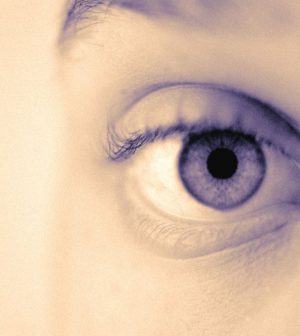- Recognizing the Signs of Hypothyroidism
- 10 Strategies to Overcome Insomnia
- Could Artificial Sweeteners Be Aging the Brain Faster?
- Techniques for Soothing Your Nervous System
- Does the Water in Your House Smell Funny? Here’s Why
- Can a Daily Dose of Apple Cider Vinegar Actually Aid Weight Loss?
- 6 Health Beverages That Can Actually Spike Your Blood Sugar
- Treatment Options for Social Anxiety Disorder
- Understanding the Connection Between Anxiety and Depression
- How Daily Prunes Can Influence Cholesterol and Inflammation
Your Eyes May Signal Your Risk for Stroke, Dementia

Your eyes may be a window into the health of your brain, a new study indicates.
Researchers found that older adults with the eye disease retinopathy were at increased risk of having a stroke, as well as possible symptoms of dementia. And on average, they died sooner than people their age without the eye condition.
Retinopathy refers to a disease the retina, the light-sensing tissue at the back of the eye. It’s often caused by diabetes or high blood pressure, both of which can damage the small blood vessels supplying the retina.
Retinopathy can lead to vision changes, such as trouble reading or seeing faraway objects. In the later stages, the damaged blood vessels may leak and cause visual disturbances like dark spots or cobweb-like streaks, according to the U.S. National Eye Institute (NEI).
Studies have linked more severe retinopathy to a higher stroke risk — possibly because both involve diseased blood vessels.
In the new study, researchers found that people with signs of retinopathy were twice as likely to report a history of stroke, versus those with no evidence of the eye disease. Similarly, they were 70% more likely to report memory problems — a potential indicator of dementia.
Over the next decade, people with the most severe retinopathy faced a two to three times higher risk of dying.
It’s not clear whether retinopathy actually foretells a future stroke or memory issues, said lead researcher Dr. Michelle Lin, an assistant professor of neurology at the Mayo Clinic in Jacksonville, Fla.
Study participants were asked about stroke history and memory problems at the same time they were evaluated for retinopathy. It’s not clear which conditions came first, Lin said.
The next step, she added, is to follow patients with retinopathy over time, to see whether the condition predicts higher stroke risk — and whether detecting retinopathy makes a difference in that risk.
Lin will present the findings at the American Stroke Association’s annual meeting, being held virtually March 17-19. Studies reported at meetings are generally considered preliminary until they are published in a peer-reviewed journal.
The results are based on more than 5,500 U.S. adults who took part in an ongoing government health study. All underwent retinal scans to look for retinopathy.
Nearly 700 were found to have the eye condition, while 289 had a history of stroke, and about 600 reported memory problems.
On average, people with retinopathy had heightened risks of stroke and memory issues — even after age, diabetes and high blood pressure were taken into account.
“It seems like there’s something about retinopathy itself,” Lin said. That is, the eye disease may give insight into what’s happening in the blood vessels of the brain.
“It’s really true that the eye is the window to the brain,” she said.
Lin encouraged people with retinopathy to work with their doctor to get control of their risk factors for cardiovascular disease, which includes stroke and heart disease. That means reining in conditions like high blood pressure, diabetes and high cholesterol.
Those measures are also key in limiting vision loss from retinopathy. Beyond that, injectable medications and laser surgery are options for more severe cases, according to the NEI.
The findings support adding retinopathy to the list of factors doctors consider in gauging patients’ stroke risk, according to Daniel Lackland, a volunteer expert with the stroke association.
That’s, in part, because detecting retinopathy is fairly simple, said Lackland, who is also a professor of epidemiology at the Medical University of South Carolina.
“And then we can work on strategies for preventing a stroke, if a person seems to have a high risk,” Lackland noted.
If people are already being treated for conditions like high blood pressure, would a retinopathy diagnosis change anything? Maybe not, though Lin said patients could be screened for memory impairment, or possibly referred for a brain MRI to look for tissue damage or problems with the blood vessels.
On the flip side, Lin said, people with cardiovascular risk factors should see an ophthalmologist to check their eye health.
More Information
The U.S. National Eye Institute has more on retinopathy.
SOURCES: Michelle Lin, MD, assistant professor, neurology, Mayo Clinic, Jacksonville, Fla.; Daniel Lackland, DrPh, professor, epidemiology, Medical University of South Carolina, Charleston, and volunteer expert, American Stroke Association; American Stroke Association virtual annual meeting, March 17-19, 2021
Source: HealthDay
Copyright © 2026 HealthDay. All rights reserved.










